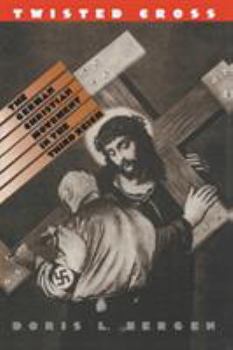Twisted Cross: The German Christian Movement in the Third Reich
Select Format
Select Condition 
Book Overview
How did Germany's Christians respond to Nazism? In Twisted Cross , Doris Bergen addresses one important element of this response by focusing on the 600,000 self-described 'German Christians, ' who... This description may be from another edition of this product.
Format:Paperback
Language:English
ISBN:0807845604
ISBN13:9780807845608
Release Date:March 1996
Publisher:University of North Carolina Press
Length:358 Pages
Weight:1.20 lbs.
Dimensions:1.0" x 6.2" x 9.3"
Customer Reviews
3 ratings
Nazi Christianity
Published by Thriftbooks.com User , 18 years ago
The two previous reviews may be well-intended, but are not quite accurate from what I read in the book. The book is an excellent indictment of Christian anti-semitism fully realized on a national level, revealing the inherent hatred of Jews so easily supported by the Christian Bible. I highly recommend this book to every Christian as a tool for some soul-searching concerning the true nature of their faith. The German Christians were not a sect. They were not a separate entity from Christian churches in Germany. It was a movement *within* typical German churches with large numbers of supporters and great influence on all Protestant Christians in Germany. In Germany at the time, and "In July 1933 Protestant church elections across Germany filled a range of positions from parish representatives to senior consistory councillors. Representatives of the German Christian movement won two thirds of the votes cast. Hitler himself had urged election of German Christians, who, he claimed in a radio address, represented the "new" in the church. Affirmed by the biggest voter turnout ever in a Protestant church election and soon ensconced in the bishops' seats of all but three of Germany's Protestant regional churches, in 1933 the movement seemed unstoppable." (pg. 7) Protestant refers to Lutheran, Reformed,and united churches in the category of Evangelical churches (not quite the same as used here in the US today).(pg. 5) SO the German Christians were not a relative few, a sect, a cult, or the "not true" Christians but instead a vast number of the Christian population---all devoted to the elimination of Jews from culture, from the nation, and physically from the land of the living. How proud their Aryan Jesus (descended from Viking tribes in Galilee!!!) must be of Christianity in Germany! This book documents the driving Christian force in Christian churches of Nazi Germany, and exposes the complicity of Christianity in the Holocaust. The everyday Germans did not sanctimoniously sit in the pews unaware of what was going on in the streets, ghettoes and camps. Jew hatred was a national endeavor taught from the pulpits, the teacher's lectern, and recited by the children of that Christian nation. Christians made up the armies, execution squads, and camp staffs who murdered men, women, children, and infants for their Nazi Christ and fatherland. This book also reveals some of the religio-social mechanics that allow such failures in humanity. It can happen here. Jesus taught repentence. Admission of guilt precedes correction and rejection of sin and evil. Christian? Read this book and start the process.
Must reading for theological cognoscenti
Published by Thriftbooks.com User , 25 years ago
Bergen's well researched and tightly written account of one German sect, the _The German Christians_ , offers a sobering account of the political consequences of a Christianity turned anti-doctrinal, anti-hierarchical, anti-Roman, people-centered, and focused on "feelings" rather than objective reality. This movement, self-designated as "The People's Church," celebrated its uniquely German form of Christianity in emotion-charged liturgies cleansed of traditional rituals and language. Stripped of long-established ritual, rules, tradition,theology, and foreign co-religionists, this wholly-German sect pressed its reconfigured notions of Christianity into the service of Nazism. Trend spotters will note ominous parallels to developments in contemporary (increasingly horizontal forms of) American Christianity. Bergen offers evidence that tinkering with religious language, liturgy, rules and doctrine can have profound socio- political consequences. Must read for all German history buffs as well as readers interested in Christian liturgy and theology. A complete copy of my review of _Twisted Cross_ appears in the September 1998 issue of Adoremus Bulletin.
An excellent book on a dark chapter in christian history
Published by Thriftbooks.com User , 25 years ago
Adherents of the German Christian movement of the 1930's and 1940's saw Nazism and Christianity as movements with shared values and a common agenda. They were given official support by the Nazi party for a time and the first and only Protestant Reich Bishop, Ludwig Mueller, was nominated from among their ranks. While traditional church historians have sought to minimize this movement as an aberration, Bergen provides evidence to support the thesis that it remained a popular mass movement throughout the years of Nazi rule. The evidence she presents further demonstrates that this Protestant sect blended together Nazi and Christian doctrine not out of expediency but out of faith. She analyzes the views not only of the leaders of the movement but also of its rank and file in order to capture a sense of their religious as well as psychological and political motivations. For most of the book, her focus is on understanding how the at once nationalist and anti-doctrinal theology of the church evolved under the pressures of the Nazi regime. In this regard, her account of their escalating struggle to purge Christianity of its Jewish roots is of particular interest. The last chapter, Postwar Echoes, gives and interesting account of the way in which German Christians tried to reconcile their old allegiances in the post war period and the way in which other Protestant sects used the high-visibility collaboration of the German Christians to avoid thorough de-Nazification at the end of the war. Hard to find documentary photographs showing the widespread blending of Christian and Nazi symbolism in church life enhance the overall value of the work.




